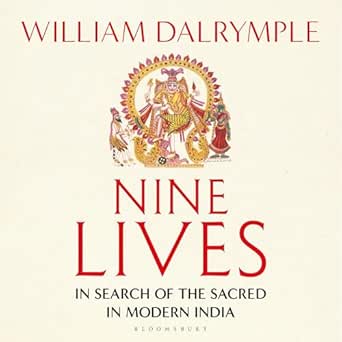Nine Lives by William Dalrymple
Nine sacred journeys revealing India’s spiritual heart and human depth.
ADULT FICTION
TL,DR version :-)
“There is no fire in hell... Everyone who goes there brings their own fire, and their own pain, from this world.”
In Nine Lives: In Search of the Sacred in Modern India, William Dalrymple journeys through the heart of India’s spiritual diversity, telling nine true stories of individuals whose lives are shaped by ancient traditions in a rapidly modernizing world.
From a Jain nun embracing non-attachment to a Theyyam dancer worshipped as a god for two months a year, Dalrymple lets each story breathe with minimal interference. His tone is intimate, respectful, and often quietly lyrical. One nun reflects, “Walking sorts out your problems and anxieties… Sometimes, even my dreams are of walking.”
What struck me most was the emotional depth and human complexity behind each path. The devadasi caught between sacred duty and social stigma. The epic singers of Rajasthan watching their oral tradition fade because “literacy itself... was killing the oral epic.”
Dalrymple’s storytelling is understated yet immersive. He fades into the background and allows his subjects to narrate their spiritual journeys in their own words, revealing a country where ancient rituals coexist—often uneasily—with modern life.
Beyond being a travelogue or ethnography, Nine Lives is a meditation on identity, tradition, and the meaning of faith in contemporary India. It made me reflect deeply on what we stand to lose—and what we must choose to preserve.
This book is a rare window into lives most of us will never encounter, yet it leaves us with a profound sense of shared humanity. A quiet, powerful read.
*****
Nine Lives by William Dalrymple – A Personal Reflection - Full Review
Nine Lives: In Search of the Sacred in Modern India is a book that quietly changed how I look at faith, identity, and the unseen spiritual world that lives beneath the surface of modern India. Written by William Dalrymple, it reads less like nonfiction and more like an intimate collection of short stories—each chapter a real-life journey into a different kind of sacred.
Spoiler-Free Synopsis
Dalrymple profiles nine people from across India (and one from Pakistan), each from a different spiritual tradition. There’s a Jain nun who has renounced everything; a devadasi in Karnataka, navigating a sacred tradition now misunderstood; a Theyyam dancer in Kerala who becomes a god for part of the year; a Tibetan monk turned warrior; a Sufi mystic who lives in a Pakistani shrine; and others including Tantrics, Bauls, and epic singers.
Each chapter is self-contained, yet together they form a patchwork quilt of India’s diverse spiritual landscape—one that’s disappearing even as it endures. The power of the book lies in its simplicity: Dalrymple lets these individuals speak for themselves. There’s no agenda, just deep listening.
Quotes That Stayed With Me
“There is no fire in hell… Everyone who goes there brings their own fire, and their own pain, from this world.”
“Walking sorts out your problems and anxieties… Sometimes, even my dreams are of walking.”
“It was not lack of interest, but literacy itself, that was killing the oral epic.”
These lines are just glimpses of the emotional and philosophical power the book offers. I found myself pausing often—not just to reflect on the lives being shared, but on my own.
Storytelling Style
Dalrymple’s brilliance lies in his restraint. He’s present, but never intrusive. The narratives are told largely in the first person, giving each chapter the feel of a personal monologue. You feel as if you're sitting across from the person, hearing their truth. There’s no exoticizing, no judgment. Just stories, told with compassion and curiosity.
The tone is quiet and reverent, but not overly serious. There are even moments of humor and irony—like the Tantric sadhu whose sons are New Jersey ophthalmologists, urging him not to share too much about his skull rituals.
The book moves like a gentle pilgrimage—each chapter a different stop along the way, each life a different shrine.
Themes That Resonate
Spirituality: These aren’t abstract concepts of faith, but lived experiences. For some, it’s asceticism and renunciation. For others, it’s music, dance, or craftsmanship. All are deeply personal paths to the divine.
Identity: Many of the characters live dual lives. A god during festival season, a laborer the rest of the year. A prostitute in society’s eyes, a bride of the goddess in her own. This tension between who we are and who we are seen as is powerful and often heartbreaking.
Tradition vs. Modernity: The book quietly explores what happens when ancient ways meet the contemporary world. Oral traditions are dying. Sacred rituals are being outlawed or misunderstood. And yet, many of these people persist—with quiet defiance and deep dignity.
Final Reflections
Reading Nine Lives felt like sitting by a fire, listening to nine people tell stories that don’t just entertain—they shake something loose in you. These are lives lived on the edges of society, but deeply rooted in the soul of India.
It’s not a book about religion. It’s a book about belief. About resilience. About finding meaning where most wouldn’t think to look.
It left me with questions, awe, and a quiet gratitude that someone took the time to record these voices. In a world growing louder with noise, Nine Lives is a reminder to listen—really listen—to the ones who still walk their own sacred paths.
*****

